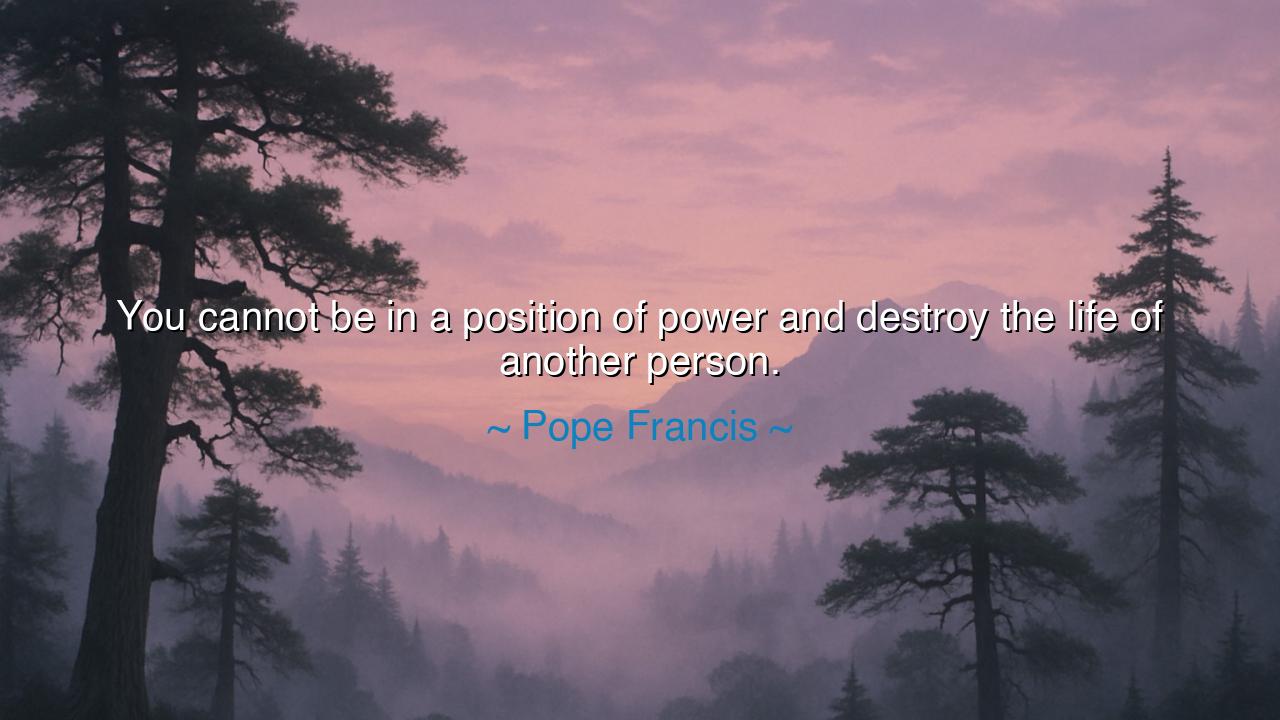
You cannot be in a position of power and destroy the life of






Pope Francis, shepherd of souls and voice of mercy, proclaims with solemn fire: “You cannot be in a position of power and destroy the life of another person.” In these words lies a truth written into the very fabric of justice: that power is not license, but responsibility. Authority exists not to crush, but to serve; not to take life, but to protect it. When power turns destructive, it ceases to be true power and becomes tyranny, corrupting both ruler and realm.
The ancients knew this danger well. Solon of Athens, when entrusted with reform, declared that laws must defend the weak from the strong. For when those in power exploit, wound, or destroy, they unravel the order of the city itself. Pope Francis echoes this ancient wisdom, reminding us that greatness of rule is not found in domination, but in safeguarding the dignity of every soul.
History bears tragic witness in the reign of Herod the Great. Though crowned in splendor, he used his authority to slaughter innocents, destroying lives to secure his throne. His power, rooted in fear, was hollow and cursed, remembered only for its cruelty. In contrast, rulers like Abraham Lincoln, wielding power amidst war, sought always to preserve life and freedom, even when burdened by terrible choices. Lincoln’s greatness endured because his use of power was tethered to compassion, not destruction.
Pope Francis also speaks to the intimate spheres of life: not only kings and presidents, but teachers, parents, employers, and all who hold sway over others. To wield influence is to hold fragile lives in one’s hands. To crush those lives through cruelty, exploitation, or indifference is to betray the sacred trust of power. For true authority is service, and its nobility lies in lifting others, not casting them down.
Let the generations remember: power without love is poison, but power guided by love becomes a blessing. He who destroys another’s life destroys himself, for every soul bears the image of the divine. But he who uses power to nurture, to heal, to protect, becomes a steward of heaven’s justice on earth. Thus Pope Francis calls us back to the highest law: that power exists not to harm, but to serve, and only in service does it find its true glory.






HQlong huy quang
Reading this, I am curious about the broader implications for governance and organizational culture. How do institutions cultivate leaders who respect life and dignity in every decision? I also question whether the warning extends beyond political power to social influence, corporate authority, or even family dynamics. The quote inspires reflection on how ethical awareness, empathy, and integrity are essential for all forms of authority to prevent harm and promote human flourishing.
MCBui Ngoc Minh Chau
This quote leads me to reflect on the intersection of power and morality. I wonder whether Pope Francis views power as a tool for service rather than control, and how that perspective might influence leadership styles. Are there practical methods to ensure that authority is exercised ethically, such as mentorship, checks and balances, or spiritual guidance? It challenges me to consider the personal responsibility leaders have to protect and uplift others.
UGUser Google
I feel challenged reading this, as it raises questions about the ethical obligations of leadership. Can someone truly wield influence without risking harm, even unintentionally? Does this apply only to overt actions, or also to policies and decisions with indirect consequences? The quote encourages me to consider how cultivating compassion, accountability, and awareness can safeguard against the potential destructiveness inherent in positions of power.
CKCao Chan Khoi
This statement sparks concern about systemic abuses of power. I wonder how societies can structure institutions to prevent individuals from harming others while in positions of authority. Are laws and regulations sufficient, or is personal moral conviction equally important? It also prompts reflection on historical and contemporary examples where power has been misused, highlighting the tension between authority, responsibility, and the value of human life.
HHmac hanh hong
Reading this, I’m struck by the moral imperative implied for those in positions of authority. It makes me question how often leaders fail to recognize the human consequences of their decisions. Does Pope Francis suggest that moral accountability should be intrinsic to power, or is external oversight necessary? The quote encourages reflection on how empathy, ethical discernment, and responsibility must guide leadership to ensure that authority is exercised without causing harm.